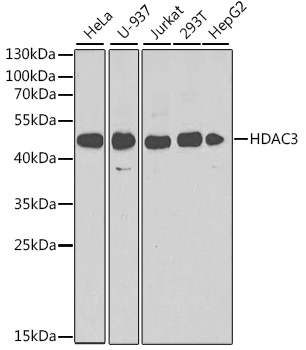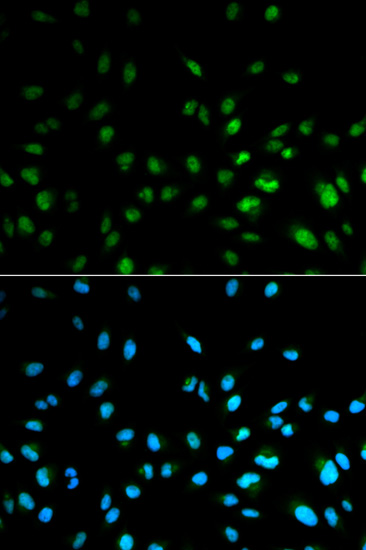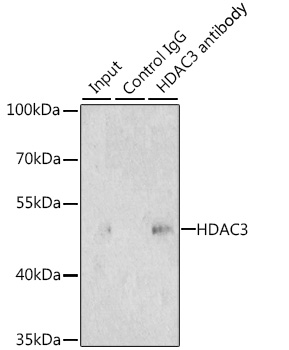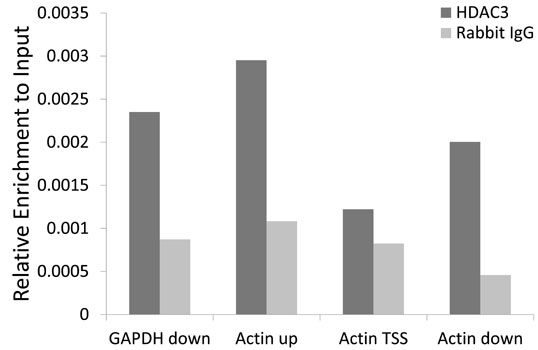Anti-HDAC3 Antibody (CAB2139)
- SKU:
- CAB2139
- Product type:
- Antibody
- Application:
- WB
- Application:
- IHC
- Application:
- IF
- Application:
- IP
- Application:
- ChIP
- Reactivity:
- Human
- Reactivity:
- Mouse
- Reactivity:
- Rat
- Host Species:
- Rabbit
- Isotype:
- IgG
- Research Area:
- Cell Biology
Description
| 抗体名: | Anti-HDAC3 Antibody |
| 抗体コード: | CAB2139 |
| 抗体サイズ: | 20uL, 50uL, 100uL |
| 申し込み: | WB IHC IF IP ChIP |
| 反応性: | Human, Mouse, Rat |
| 宿主種: | Rabbit |
| 免疫原: | Recombinant fusion protein containing a sequence corresponding to amino acids 299-428 of human HDAC3 (NP_003874.2). |
| 申し込み: | WB IHC IF IP ChIP |
| 推奨希釈: | WB 1:500 - 1:2000 IHC 1:50 - 1:100 IF 1:50 - 1:200 IP 1:50 - 1:200 ChIP 1:20 - 1:100 |
| 反応性: | Human, Mouse, Rat |
| ポジティブサンプル: | HeLa, U-937, Jurkat, 293T, HepG2 |
| 免疫原: | Recombinant fusion protein containing a sequence corresponding to amino acids 299-428 of human HDAC3 (NP_003874.2). |
| 精製方法: | Affinity purification |
| ストレージバッファ: | Store at -20'C. Avoid freeze / thaw cycles. Buffer: PBS with 0.02% sodium azide, 50% glycerol, pH7.3. |
| アイソタイプ: | IgG |
| 順序: | TVRN VARC WTYE TSLL VEEA ISEE LPYS EYFE YFAP DFTL HPDV STRI ENQN SRQY LDQI RQTI FENL KMLN HAPS VQIH DVPA DLLT YDRT DEAD AEER GPEE NYSR PEAP NEFY DGDH DNDK ESDV EI |
| 遺伝子ID: | 8841 |
| Uniprot: | O15379 |
| セルラーロケーション: | Cytoplasm, Nucleus, cytosol |
| 計算された分子量: | 48kDa/49kDa |
| 観察された分子量: | 47kDa |
| 同義語: | HD3, RPD3, RPD3-2, HDAC3 |
| バックグラウンド: | Histones play a critical role in transcriptional regulation, cell cycle progression, and developmental events. Histone acetylation/deacetylation alters chromosome structure and affects transcription factor access to DNA. The protein encoded by this gene belongs to the histone deacetylase/acuc/apha family. It has histone deacetylase activity and represses transcription when tethered to a promoter. It may participate in the regulation of transcription through its binding with the zinc-finger transcription factor YY1. This protein can also down-regulate p53 function and thus modulate cell growth and apoptosis. This gene is regarded as a potential tumor suppressor gene. |
| UniProt Protein Function: | HDAC3: Responsible for the deacetylation of lysine residues on the N-terminal part of the core histones (H2A, H2B, H3 and H4), and some other non-histone substrates. Histone deacetylation gives a tag for epigenetic repression and plays an important role in transcriptional regulation, cell cycle progression and developmental events. Histone deacetylases act via the formation of large multiprotein complexes. Probably participates in the regulation of transcription through its binding to the zinc-finger transcription factor YY1; increases YY1 repression activity. Required to repress transcription of the POU1F1 transcription factor. Acts as a molecular chaperone for shuttling phosphorylated NR2C1 to PML bodies for sumoylation. Interacts with HDAC7 and HDAC9. Forms a heterologous complex at least with YY1. Interacts with DAXX, HDAC10 and DACH1. Found in a complex with NCOR1 and NCOR2. Component of the N-Cor repressor complex, at least composed of NCOR1, NCOR2, HDAC3, TBL1X, TBL1R, CORO2A and GPS2. Interacts with BCOR, MJD2A/JHDM3A, NRIP1, PRDM6 and SRY. Interacts with BTBD14B. Interacts with GLIS2. Interacts (via the DNA-binding domain) with NR2C1; the interaction recruits phosphorylated NR2C1 to PML bodies for sumoylation. Component of the Notch corepressor complex. Interacts with CBFA2T3 and NKAP. Interacts with APEX1; the interaction is not dependent on the acetylated status of APEX1. Interacts with and deacetylates MAPK14. Interacts with ZMYND15. Widely expressed. Belongs to the histone deacetylase family. HD type 1 subfamily. 2 isoforms of the human protein are produced by alternative splicing. |
| UniProt Protein Details: | Protein type:Transcription, coactivator/corepressor; Deacetylase; EC 3.5.1.98; Cell cycle regulation; Apoptosis; Nuclear receptor co-regulator Chromosomal Location of Human Ortholog: 5q31 Cellular Component: nucleoplasm; Golgi apparatus; transcriptional repressor complex; spindle microtubule; histone deacetylase complex; cytoplasm; plasma membrane; nucleus Molecular Function:chromatin DNA binding; histone deacetylase binding; protein deacetylase activity; transcription factor binding; cyclin binding; NAD-dependent histone deacetylase activity (H3-K9 specific); protein binding; enzyme binding; NAD-dependent histone deacetylase activity (H3-K14 specific); NAD-dependent histone deacetylase activity (H4-K16 specific); chromatin binding; histone deacetylase activity; transcription corepressor activity Biological Process: circadian rhythm; negative regulation of JNK cascade; Notch signaling pathway; establishment and/or maintenance of chromatin architecture; nerve growth factor receptor signaling pathway; transcription, DNA-dependent; regulation of mitotic cell cycle; regulation of multicellular organism growth; regulation of protein stability; chromatin modification; negative regulation of transcription from RNA polymerase II promoter; spindle assembly; cellular lipid metabolic process; negative regulation of cell cycle; protein amino acid deacetylation; positive regulation of transcription factor import into nucleus; positive regulation of transcription from RNA polymerase II promoter; positive regulation of protein amino acid phosphorylation; circadian regulation of gene expression; negative regulation of transcription, DNA-dependent; positive regulation of TOR signaling pathway; negative regulation of apoptosis |
| NCBI Summary: | Histones play a critical role in transcriptional regulation, cell cycle progression, and developmental events. Histone acetylation/deacetylation alters chromosome structure and affects transcription factor access to DNA. The protein encoded by this gene belongs to the histone deacetylase/acuc/apha family. It has histone deacetylase activity and represses transcription when tethered to a promoter. It may participate in the regulation of transcription through its binding with the zinc-finger transcription factor YY1. This protein can also down-regulate p53 function and thus modulate cell growth and apoptosis. This gene is regarded as a potential tumor suppressor gene. [provided by RefSeq, Jul 2008] |
| UniProt Code: | O15379 |
| NCBI GenInfo Identifier: | 3334210 |
| NCBI Gene ID: | 8841 |
| NCBI Accession: | O15379.2 |
| UniProt Secondary Accession: | O15379,O43268, Q9UEI5, Q9UEV0, D3DQE1, |
| UniProt Related Accession: | O15379 |
| Molecular Weight: | 49,111 Da |
| NCBI Full Name: | Histone deacetylase 3 |
| NCBI Synonym Full Names: | histone deacetylase 3 |
| NCBI Official Symbol: | HDAC3 |
| NCBI Official Synonym Symbols: | HD3; RPD3; RPD3-2 |
| NCBI Protein Information: | histone deacetylase 3; SMAP45 |
| UniProt Protein Name: | Histone deacetylase 3 |
| UniProt Synonym Protein Names: | RPD3-2; SMAP45 |
| Protein Family: | Histone deacetylase |
| UniProt Gene Name: | HDAC3 |
| UniProt Entry Name: | HDAC3_HUMAN |





